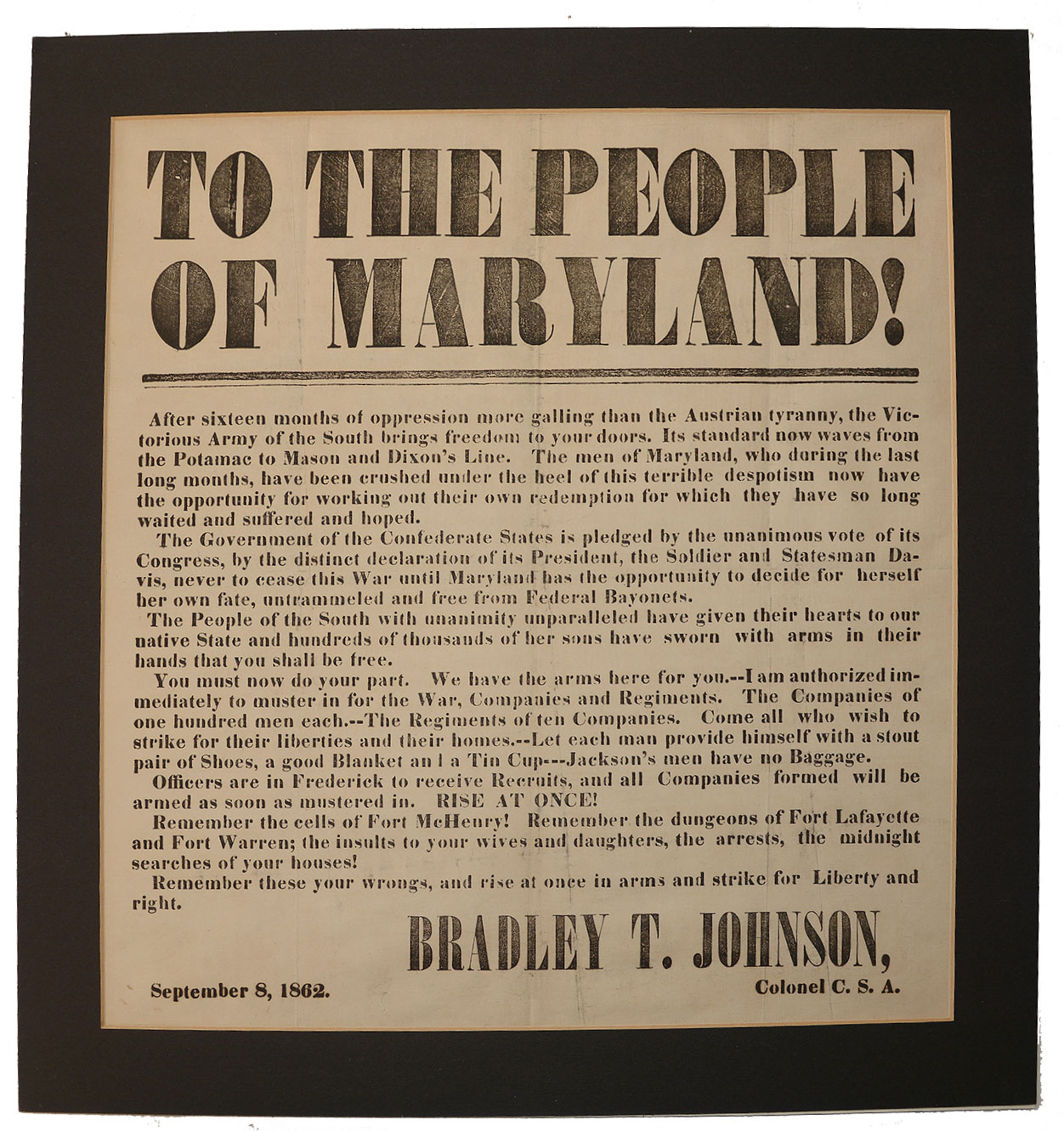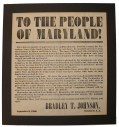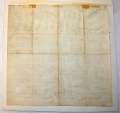site search
online catalog
RARE CONFEDERATE MARYLAND BROADSIDE: ANTIETAM CAMPAIGN

$9,500.00 SOLD
Quantity Available: None
Item Code: 2025-111
Born in Frederick, MD, in 1829, Bradley Tyler Johnson was educated at Princeton and Harvard, admitted to the Maryland bar in 1851, and a lawyer by profession. He pulled out all the rhetorical stops in this impassioned address to potential Confederate soldiers in his native state on September 8, 1862. Just four copies are listed by OCLC in public collections.
In the wake of the thorough thrashing given John Pope’s Army of Virginia at Second Manassas just days before, Lee began crossing his army over the Potomac into Maryland at White’s and Cheek’s fords, heading for Frederick, where he set up headquarters from September 6 to September 10. Lee published his own address “To the People of Maryland,” also on September 8, mentioning the sympathies of the Confederate states for Maryland, to whom they are “allied” by “the strongest social, political and commercial ties,” and reciting some of the wrongs to which citizens of the state have been subjected: “your Legislature has been dissolved by the unlawful arrest of its members; freedom of the press and of speech has been suppressed; words have been declared offences by an arbitrary decree of the Federal Executive, and citizens ordered to be tried by a military commission for what they may dare to speak,” etc. Lee then promises they will be allowed to make their own choices in the matter: “This army will respect your choice whatever it may be, and while the Southern people will rejoice to welcome you to your natural position among them, they will only welcome you when you come of your own free will.”
In contrast to Lee’s appeal to more general principles and values, Johnson, appointed Provost Marshall of his old hometown, is interested mainly in getting Marylanders into the Confederate army, and turns the dial up to eleven to do so, referring to,“oppression more galling than the Austrian tyranny,” and to Marylanders “crushed under the heel of this terrible despotism,” closing with the admonition to “RISE AT ONCE,” and an appeal to, “Remember the cells of Fort McHenry! Remember the dungeons of Lafayette and Fort Warren: the insults to your wives and daughters, the arrests, the midnight searches of your houses!” and a battle cry to, “Remember these wrongs, and rise at once in arms and strike for Liberty and right."
Johnson acted out of conviction and state pride, mixed with some self-interest. He had helped raise companies for a regiment of Marylanders for Confederate service in 1861, becoming Major, Lieutenant Colonel, and eventually Colonel, in March 1862, of the 1st Maryland Regiment as part of Jackson’s command, but they had been serving under Virginia sponsorship and had also recently mustered out. Many would return to service, though as a battalion, while Johnson had his sights set on something bigger. He had accompanied Jackson and been given temporary command of J.R. Jones’s Virginia brigade for the move north and done well at Groveton on Aug. 28 and at Second Manassas on Aug. 29 and 30, so much so that Jackson recommended him several times for promotion to Brigadier General. The move into Maryland of the Army of Northern Virginia was thus a recruiting opportunity for a distinct “Maryland Line” that he was apparently determined to make the most of: “You must do your part. We have the arms here for you. . . Come all who wish to strike for their liberties and homes . . .”
Johnson had been in Jackson’s Corps in the recent campaign and even evokes the image of Jackson’s “foot cavalry:” “Let each man provide himself with a stout pair of Shoes, a good Blanket and a Tin Cup—Jackson’s men have no Baggage.” It seems that rapid marching and maneuver will win the day, although the Virginia troops under his command had just come through three days of heavy fighting, and the bloodiest single day of the war lay just nine days off. In fact, Johnson missed the rest of the Antietam Campaign. Having been sent to Richmond with dispatches, he was detained there by his legal acumen for courtmartial duty, though given the rank of Colonel of cavalry to keep him in the service. He continued to lobby for creation of the Maryland Line, which was finally authorized in June 1863, but not organized until late in the year, and that in very reduced form, with most Marylanders preferring to stay in their accustomed units. He did see some action with them, but when he finally received his promotion to Brigadier General he was given command of a cavalry brigade.
This is rare broadside and a telling reminder of thwarted southern hopes for bringing Maryland, or at least a decisive number of its citizens, into the war to dissolve the Union and reflects an intersection of military, political, and social forces. It would be a great addition to an Antietam collection or a Maryland display. The broadside measures 13-1/2” by 14-1/4” and is in a 15” by 16” black mat. It was originally taped and glued along its upper edge to the reverse of the mat. Only the left corner still adheres. The print is bold and it displays very nicely. There are some fold lines, but no tears, losses, or foxing. [sr][ph:L]
~~~~~~~~~~~~~~~~~~~~~~~~~~~~~~~~~~~
THIS ITEM, AS WITH ALL OTHER ITEMS AVAILABLE ON OUR WEB SITE,
MAY BE PURCHASED THROUGH OUR LAYAWAY PROGRAM.
CLICK HERE FOR OUR POLICIES AND TERMS.
THANK YOU!
Inquire About RARE CONFEDERATE MARYLAND BROADSIDE: ANTIETAM CAMPAIGN
For inquiries, please email us at [email protected]
Most Popular
Historical Firearms Stolen From The National Civil War Museum In Harrisburg, Pa »
Theft From Gravesite Of Gen. John Reynolds »
Selection Of Unframed Prints By Don Troiani »
Fine Condition Brass Infantry Bugle Insignia »
British Imported, Confederate Used Bayonet »
Scarce New Model 1865 Sharps Still In Percussion Near Factory New »
featured item
CONFEDERATE CAVALRY CAPTAIN’S FROCK COAT OF CAPT. EDWARD BIRD, “EFFINGHAM HUSSARS,” 2nd BATTALION AND 5th REGIMENT GEORGIA CAVALRY
This rare, identified, Confederate cavalry captain’s frock coat belonged to an officer who served from 1861 though 1865, rising from Captain to Colonel, with extensive action especially in Wheeler’s cavalry corps fighting against Sherman in the… (1179-232). Learn More »
site search
Upcoming Events
May 16 - 18: N-SSA Spring Nationals, Fort Shenandoah, Winchester, VA Learn More »






